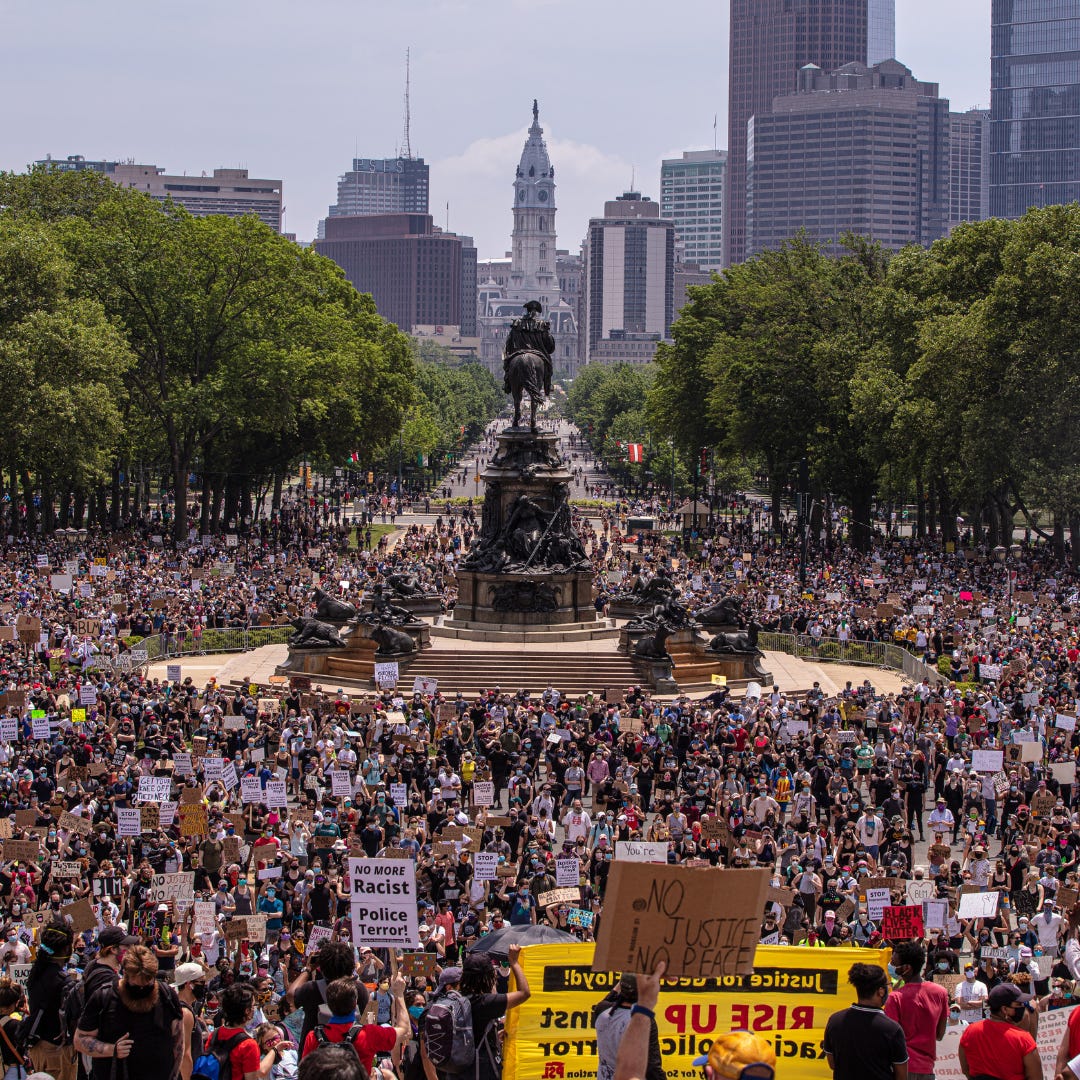The People, Not the Powerful
Introducing my new weekly blog: The People's Path
There is a growing sense of helplessness in America. On the left, many Democratic voters and grassroots activists feel dejected by the Democratic establishment’s lack of urgency in this time of great constitutional and democratic peril. On the right, years of anger, frustration, and the feeling of being left behind—culturally, economically, racially—have led many in the Republican Party to embrace an authoritarian movement anathema to our shared history as a proud constitutional Republic.
Regardless of political ideology, both sides of the aisle share a frustration with our institutions and, unfortunately, one another. Just 28% of Americans have confidence in their social, economic, and political institutions.1 When it comes to one another, studies show that while ideological polarization—the difference in political opinions—remains relatively moderate, “affective polarization”—defined as the gap between individuals’ feelings toward their own political party and negative feelings toward the opposing party—have increased precipitously in the past two decades.2 By measuring affective polarization in degrees on a scale of 0 (very cold) to 100 (very hot), political scientists find that average feelings toward members of the other party have fallen from 48 degrees in the 1970s and ‘80s to 20 degrees today, indicating intensified negative feelings for people with whom we disagree. It is no wonder that political partisans believe the policy gap is too wide to find common ground.3
Political polarization even effects who we marry and date. A recent study found that just 8% of married or engaged couples have a spouse or partner who belongs to a different political party.4 7 in 10 Democrats will not date a Republican, and 43% of Republicans said the same about dating a Democrat.5 In one study examining voting dissimilarity and relationship quality after the 2016 election, researchers found that voting differently from one’s partner led to higher levels of stress, greater relational conflict, and a weakened ability to work together as one team.6 Crass as it may seem, if we refuse to sleep with someone with a different political bent, how can we see each other as friends, and not enemies?
These fissures within our American social fabric are a sign of the same frayed, violent, and egomaniacal socio-economic policies that the current political establishment and the billionaire class have wrought. The normalization of hate, the deportation of nonviolent permanent residents without due process, and the growing wealth and income gap all point to a country crying out for help, for stability, for a return to normal.
But how do we achieve that return to normal?
For all of its flaws, even in the current historical moment, the United States is an imminently democratic country. Democracy is engrained in our cultural and ideological heritage and intertwines itself within our social, economic, and political lives. But democracy depends on an engaged, educated, and active citizenry, one the recognizes the dignity and liberty of each person living in this great country. To lift ourselves out of this quagmire—one created by tribal politics and elite economic entrenchment, yet largely embraced by ordinary Americans—we must utilize our collective democratic rights as a combat weapon.
We share one Common Creed: that all men and women “are created equal, that they are endowed by their Creator with certain unalienable Rights” of life, liberty, and the pursuit of happiness. That Common Creed has been the driving force for America’s good in the world since its founding. It is a creed underpinning each mass movement, each arc toward a more just, open, and democratic society. If we still believe in this Common Creed, this mission statement for who we are as a country, we must be willing to set aside our egos, temper our desires, and foster a more engaged and active political, social, and economic life among ourselves, all with the aim of ensuring that future generations embrace this same call to democracy and true human freedom.
My goal with The People’s Path is to harness the helplessness we share into actionable ways in which we, the average American, can combat the growing attacks against our Common Creed. By weaving history, political philosophy, and appropriate context to the important stories of the week, I hope to provide clarity on how public policy, elite economic agendas, and popular media effects the average American.
You will notice that in these posts I attack and lament most of the policies and preferences of the Trump-Vance Administration. This lament is not fueled by political animus, but instead by a strongly-held belief in criticizing the status quo—regardless of political party—and questioning authority. After all, Trump and his movement are the new establishment class.
If there is a political bias, it is this: that our politics, economics, and culture should be controlled by the average American, not by the vulture class of politicians and billionaires hellbent on undermining our Common Creed. If you share this belief, even if you do not agree with all the topics I write about, I simply ask that you keep an open mind and remember that the new establishment class does not have your best interests in mind.
The fear, despondency, and antipathy we have for our institutions and one another are misdirected. Instead of blaming each other, we should be pointing our ire upward to the establishment class. If The People’s Path can help redirect our fear, despondency, and antipathy away from one another and toward those who control our politics, economics, and culture, then I will have done my part in reviving the promise of America and our Common Creed.
So, I hope that you’ll join me on this path to a brighter future. We are living through a time of great peril, and we must remain vigilant against the nefarious and selfish forces wishing to exert their power to intimidate and dissuade us from asserting our sovereign power. It is up to us, the average American, to forge a new path.
https://news.gallup.com/poll/647303/confidence-institutions-mostly-flat-police.aspx
https://www.pewresearch.org/short-reads/2024/08/01/many-americans-are-confident-the-2024-election-will-be-conducted-fairly-but-wide-partisan-differences-remain/
https://carnegieendowment.org/research/2023/09/polarization-democracy-and-political-violence-in-the-united-states-what-the-research-says?lang=en
https://www.psypost.org/democrats-rarely-have-republicans-as-romantic-partners-and-vice-versa-study-finds/
https://www.pewresearch.org/short-reads/2020/04/24/most-democrats-who-are-looking-for-a-relationship-would-not-consider-dating-a-trump-voter/
https://journals.sagepub.com/doi/10.1177/0265407519846566


